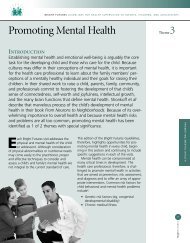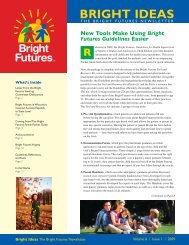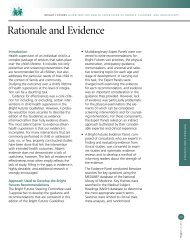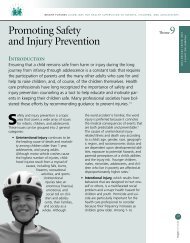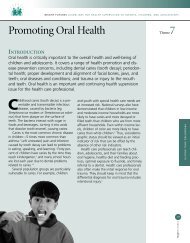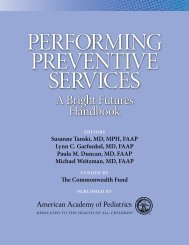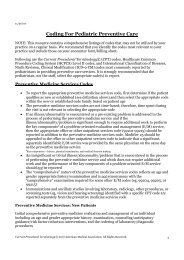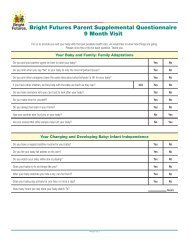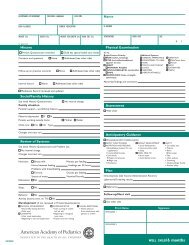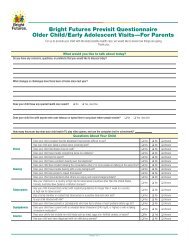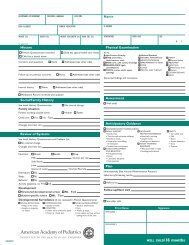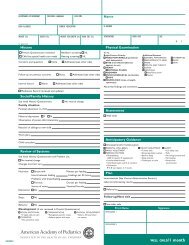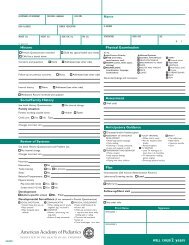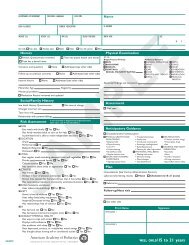POCKET GUIDE - Bright Futures - American Academy of Pediatrics
POCKET GUIDE - Bright Futures - American Academy of Pediatrics
POCKET GUIDE - Bright Futures - American Academy of Pediatrics
Create successful ePaper yourself
Turn your PDF publications into a flip-book with our unique Google optimized e-Paper software.
Anticipatory Guidance<br />
discuss with Parents <strong>of</strong> all infants<br />
■ growing infants are more easily distracted during feeding<br />
and need gentle, repetitive stimulation (rocking, patting,<br />
stroking) or feeding in a room with fewer distractions<br />
(lights, noise, other people).<br />
■ indications <strong>of</strong> colic (crying inconsolably for several hours<br />
and passing a lot <strong>of</strong> gas). (if the mother is breastfeeding,<br />
recommend short, frequent feedings.)<br />
■ Forgoing foods other than breast milk or infant formula<br />
until their infant is developmentally ready (at about age<br />
4–6 months, when the sucking reflex changes to allow<br />
coordinated swallowing and the infant is sitting with<br />
support and has good head and neck control).<br />
■ Adding cereal to their infant’s diet will not help the infant<br />
sleep through the night.<br />
■ Playing with their infant (encouraging the infant to follow<br />
objects with his eyes) to stimulate the nervous system and<br />
help develop head and neck control and motor skills.<br />
■ encouraging “tummy time” to promote head control and<br />
gross motor development.<br />
discuss with Parents <strong>of</strong> breastfed infants<br />
■ Breastfeeding their infant 8 to 12 times in 24 hours, and<br />
feeding more frequently during growth spurts.<br />
■ By age 3 months, feeding their infant every 2 to 3 hours,<br />
but they may have one longer stretch <strong>of</strong> 4 to 5 hours at<br />
night between feedings.<br />
■ stools may be as infrequent as once every 3 days.<br />
discuss with Parents <strong>of</strong> formula-fed infants<br />
■ Feeding their infant on average 26 to 28 oz <strong>of</strong> formula, but<br />
the infant may consume up to 32 oz <strong>of</strong> formula in 24 hours<br />
(infants feed every 3–4 hours, with one longer stretch at<br />
night <strong>of</strong> up to 5 or 6 hours between feedings).<br />
4 monThs<br />
Interview Questions<br />
for Parents <strong>of</strong> all infants<br />
■ tell me about what you are feeding your baby. how <strong>of</strong>ten<br />
are you feeding her?<br />
■ Are you feeding your baby any foods besides breast milk<br />
or formula?<br />
■ have you thought about when you will begin to give your<br />
baby solids?<br />
17<br />
<strong>Bright</strong> FUTURES<br />
Infancy



